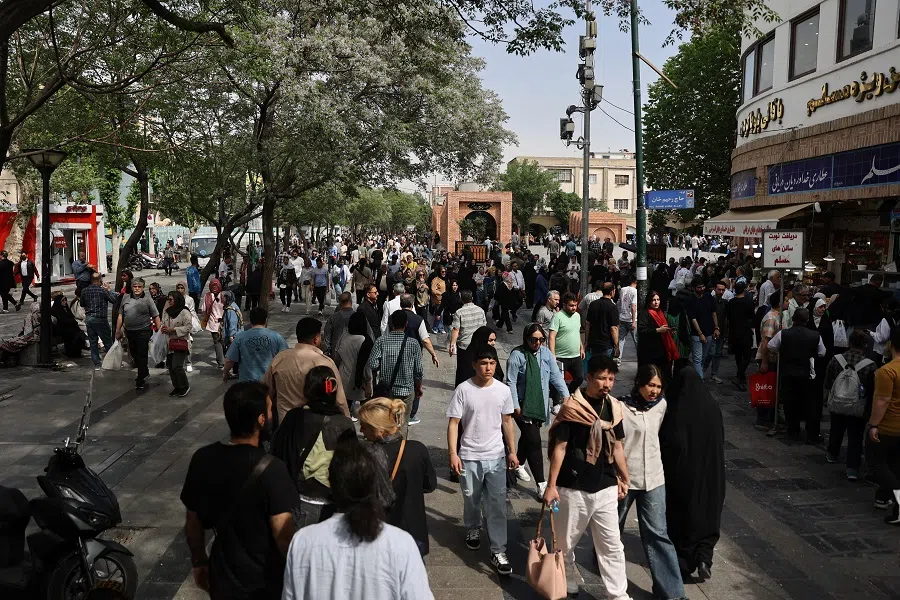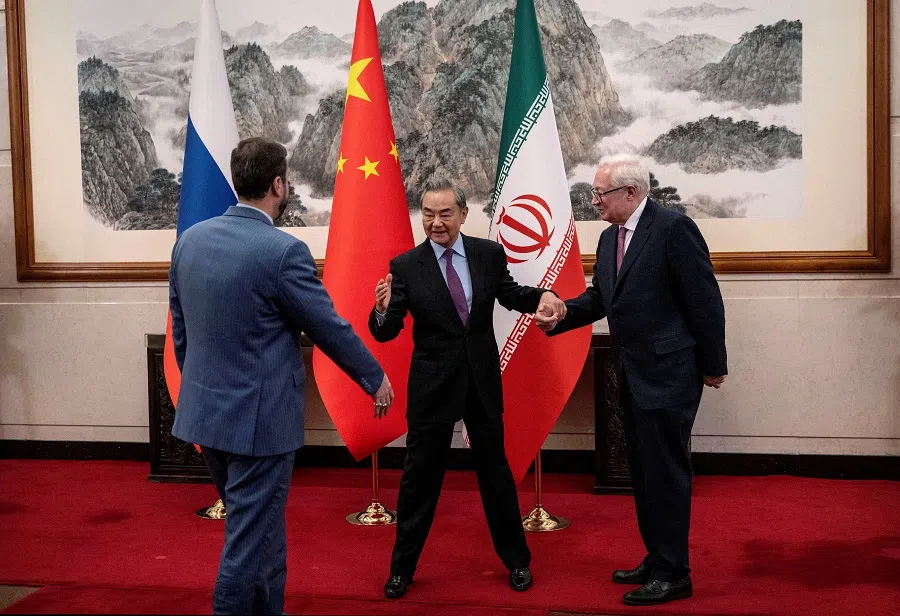Why China should welcome a US-Iran thaw
How should China navigate the potential easing of US-Iran relations under the Trump administration? According to Chinese academic Fan Hongda, Beijing has no reason to be overly concerned — after all, a more amicable US-Iran relationship could be beneficial to China.

On 7 April, during a meeting with Israeli Prime Minister Benjamin Netanyahu, US President Donald Trump told reporters that senior delegations from the US and Iran would hold direct talks on 12 April. Shortly afterwards, Iranian Foreign Minister Abbas Araghchi confirmed the meeting but stated that the US and Iranian representatives would hold indirect, not direct, talks in Oman on Saturday.
Despite different understandings on whether the negotiations are direct or indirect, the two countries have successfully held two rounds of negotiations. After the second round of negotiations concluded on 19 April, the mediator, Oman’s foreign minister, remarked that “now even the unlikely is possible.”
Moreover, the expert-level negotiations between the US and Iran and the third round of political negotiations will be launched this week. Since 12 April, Iran’s stock market and foreign exchange market have risen rapidly, which largely expresses Iran’s strong expectations for the US-Iran negotiations. In my opinion, détente between Washington and Tehran has been a trend, and it is now clearly accelerating.
Thawing of US-Iran relations under Trump
The White House’s stance towards Iran has shifted somewhat since the start of Trump’s second administration. President Trump has both threatened Tehran and extended goodwill. Tehran, in turn, responded in kind. On 12 March, the US conveyed a letter from Trump to Iran’s Supreme Leader Ali Khamenei via the United Arab Emirates, proposing direct negotiations. On 26 March, Iran sent a reply from Khamenei to Trump through Oman, indicating that indirect talks with the US were a viable option.
On 30 March, Trump stated that if negotiations failed to produce a new nuclear agreement, the US would bomb Iran. These official interactions suggest both a hope for a thaw in relations and the potential for escalating conflict. I am inclined to believe that Trump’s Iran policy in his second term will differ from his first. Currently, easing tensions with Iran seems more important to Trump than confrontation.
... whether from the perspective of great power competition or the strategic needs of the Middle East, continued confrontation with Iran does not serve America’s national interests.

Currently, there is no direct conflict of core interests between the US and Iran. Moreover, whether from the perspective of great power competition or the strategic needs of the Middle East, continued confrontation with Iran does not serve America’s national interests. Although Israel remains a key factor constraining the improvement of US-Iran relations, its influence is gradually declining. President Trump announced in front of Israeli Prime Minister Benjamin Netanyahu that the US would negotiate directly with Iran, which largely means that Netanyahu has to accept Washington’s softening of its attitude toward Tehran.
It is also worth noting that Trump portrays himself as a peace-seeking president, and his aspirations for the Nobel Peace Prize are frequently mentioned. He prefers to resolve problems with a “deal-making” mindset.
Iranians hope for change
When it comes to improving US-Iran relations, Iran arguably has more of an urgent need than America. Since 2009, frequent public protests and the sharp devaluation of its currency in recent years have highlighted the severe political, security, and economic challenges facing the country. Despite internal resistance, the voices within Iran advocating for better relations with the US are growing stronger.
In fact, many Iranians hoped Trump would win the 2024 US presidential election. Under the immense pressure of a worsening economic crisis, some Iranians hope for fundamental change in their country and believe that Trump might be able to help achieve that.
Over the past year or so, the so-called “Axis of Resistance” — including Hamas, Hezbollah, the Houthi rebels, and the Bashar al-Assad regime in Syria — has suffered major setbacks or collapse. As the presumed leader of this axis, Iran’s geopolitical environment has deteriorated, presenting it with an opportunity to discuss its foreign policy.
Internal conflict on US approach
Against this backdrop, the question of how to approach the US has become a fiercely debated issue within Iran. The reformist camp, led by President Masoud Pezeshkian — along with a growing number of ordinary citizens — supports improving relations with the US, even advocating for direct negotiations. Meanwhile, the conservative faction, represented by the Islamic Revolutionary Guard Corps (IRGC), firmly opposes any talks with the US.
Currently, the US-Iran negotiations are at the moment of least resistance in decades.

To a large extent, many of the current development challenges facing Iran could be quickly resolved if US-Iran relations were normalised. The key obstacles to Iran’s development include a lack of foreign investment and advanced technology. Once relations with the US are normalised, most — if not all — international sanctions imposed on Iran could be lifted.
Without these sanctions, Iran’s abundant natural resources, such as oil, and its vast market potential would attract foreign investment and technology with little hesitation.
In short, since the founding of the Islamic Republic in 1979, Iran has maintained an anti-American and anti-Israel policy for 46 years. However, the foundations of this policy are steadily weakening, while calls within Iran to improve relations with the US are growing louder. Despite the anti-American propaganda of the Islamic Republic and the painful memory of the 1979 occupation of the US Embassy in Iran — when dozens of American diplomats were held hostage for over 400 days — Trump surely understands that present-day Iran no longer poses a threat to America’s core interests.
Just as Supreme Leader Khamenei chose to negotiate amid internal divisions in Iran, President Trump also balanced domestic opposition to come to the negotiation table. Currently, the US-Iran negotiations are at the moment of least resistance in decades.
Given the ever-changing dynamics of the Middle East and the global landscape, it can be reasonably asserted that the likelihood of improved US-Iran relations under Trump’s second administration is quite high. I would even go so far as to say that this is already becoming a trend. As a country that has long maintained friendly relations with Tehran and whose own tensions with the US are growing, China needs to calmly face this evolving reality in US-Iran relations.
... the thawing of relations between the US and Iran does not require China’s involvement. The US has long regarded China as its primary strategic competitor, and Washington will not allow Beijing to interfere in US-Iran affairs.
Chinese deep involvement in Middle Eastern geopolitics unlikely
After China helped broker a reconciliation agreement between Saudi Arabia and Iran in Beijing in 2023, many Chinese students began to advocate for China to play a more prominent role in mediating international disputes, including those between Iran and Israel, or Iran and the US.
Frankly speaking, I do not believe that China can play a mediating role in improving US-Iran or Israel-Iran relations. Just like the last two rounds of US-Iran talks, the thawing of relations between the US and Iran does not require China’s involvement. The US has long regarded China as its primary strategic competitor, and Washington will not allow Beijing to interfere in US-Iran affairs.

Iran is fully aware of the state of US-China relations; to this day, Tehran’s greatest willingness to cooperate with China still lies in the economic and trade sphere. In matters concerning national security, Tehran has consistently shown a stronger inclination to cooperate with Russia rather than China.
Looking ahead, it will also be difficult for China to play a role in the easing of Iran-Israel relations. Once US-Iran relations get back on track, Washington will undoubtedly push for improved ties between Israel and Iran, and it will not allow China to become involved in that process either. It is also very likely that Israel and Iran will share that sentiment.
China can still benefit in other ways
However, in my view, the easing of US-Iran relations may have an even more positive impact on China, because it would mean that the international sanctions imposed on Iran would gradually be lifted. A more diplomatically diversified Iran is unlikely to abandon China, and this would create more opportunities for cooperation between the two countries. After all, due to the current international sanctions on Iran, many capable Chinese companies and businesspeople are reluctant to engage with Iran.
Therefore, the lifting of international sanctions would be beneficial to China-Iran engagement. Moreover, a thaw in Iran’s relations with the US and Israel would greatly contribute to peace in the Middle East. China’s strengths are best manifested and exercised in a peaceful Middle East. As such, China should adopt a more positive mindset toward improving US-Iran interactions and the easing of their bilateral relationship.
This article was first published in Lianhe Zaobao as “美伊关系向好 中国也能受惠”.





![[Big read] When the Arctic opens, what happens to Singapore?](https://cassette.sphdigital.com.sg/image/thinkchina/da65edebca34645c711c55e83e9877109b3c53847ebb1305573974651df1d13a)